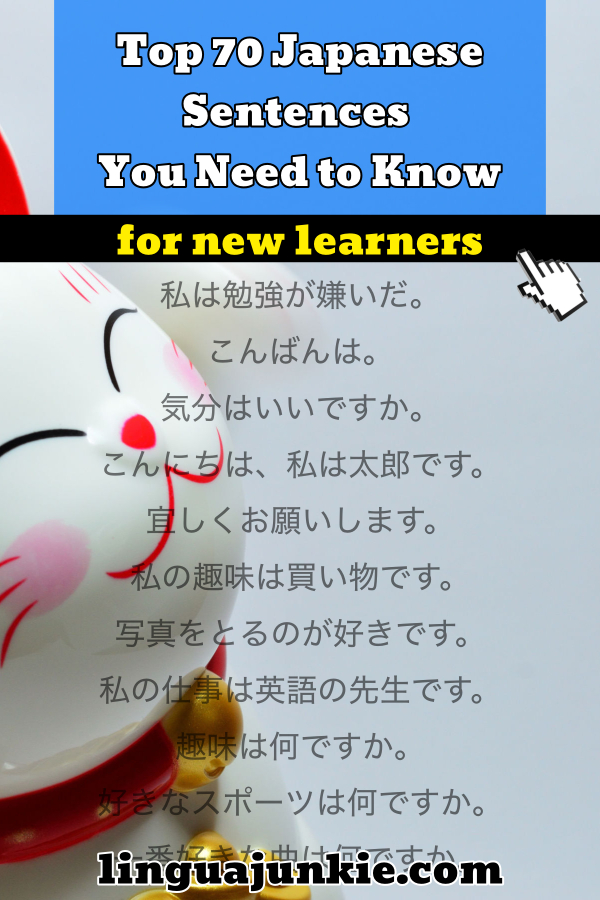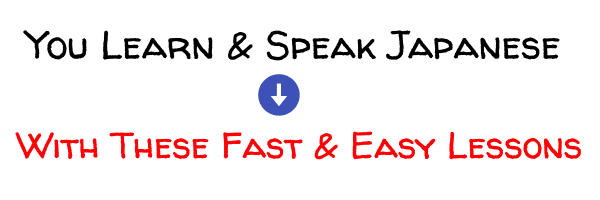Why learn Japanese sentences?
Because you get to learn new words, phrases and grammar all at once. Learning words one at a time is slow. Learning grammar rules one at a time is painful. But sentences give you everything you need. Plus, people speak in sentences so… it’ll help you speak Japanese.
You know, instead of blurting out words one at a time.
Top 70 Japanese Sentences You Need to Know

Greetings and Pleasantries
You’re going to see a lot of “konnichiwas” here to the point where it’ll get stuck in your head. And that’s good. That’s the power of learning with Japanese sentences.
1. Hello. This is Ogawa speaking.
- もしもし。小川ですが。
- Moshi moshi. Ogawa desu ga.
“Moshi moshi” is only used when answering the phone. To say hello in Japanese, you’ll need another word.
2. Hello, Tom.
- こんにちは、トム。
- Konnichiwa, Tomu.
Here, you’re just addressing some guy named Tom.
Feel free to swap the name out for someone else’s.
By the way, here’s a free audio lesson.
Since you’re learning Japanese, you should also HEAR it too. So, in this 3 minute lesson from JapanesePod101 (click here to visit & get more lessons) you’ll learn how to say hello.
- 3-Minute Japanese – Greetings
3. Hello, I am Taro. Nice to meet you.
- こんにちは、私は太郎です。宜しくお願いします。
- Konnichiwa. Watashi wa Taro desu. Yoroshiku onegaishimasu.
The last phrase here, the “yoroshiku onegaishimasu” does not literally mean “nice to meet you. It’s a Japanese set phrase that you’d use when meeting new people. It means “treat me well.” You can learn more in the set phrases link above.
4. Hello. I’m Nancy.
- こんにちは。私はナンシーです。
- Konnichiwa. Watashi wa nanshii desu.
Here, you’re introducing yourself in Japanese. You can take out Nancy’s name and stick in your own.
5. How‘re you doing?
- 調子はどうですか。
- Choushi wa dou desu ka?
6. How are you feeling?
- 気分はいいですか。
- Kibun wa ii desu ka?
7. How’re you doing?
- 元気ですか。
- Genki desu ka?
8. Good evening.
- こんばんは。
- Konbanwa.
9. Good morning, Mike.
- おはよう、マイク。
- Ohayou, Maiku.
10. Good day, how are you?
- こんにちは、お元気ですか。
- Konnichiwa, o genki desu ka?
11. Nice to meet you.
- 初めまして。
- Hajimemashite.
12. How do you do, my name is Douglas. Nice to meet you.
- はじめまして、私の名前はダグラスです、よろしくお願いします。
- Hajimemashite, watashi no namae wa dagurasu desu. Yoroshiku onegaishimasu.
About Yourself
Now, here are a whole bunch of Japanese sentences describing yourself. Where you’re from. What your hobbies are.
Also, you’re going to see a lot of “watashi” here which means “I.”
13. I am from Brazil.
- 私はブラジルの出身です。
- Watashi wa burajiru no shusshin desu.
Note that “shusshin” means place of origin.
14. I’m from France.
- フランスから来ました。
- Furansu kara kimashita.
15. I come from America.
- 私はアメリカ出身です。
- Watashi wa amerika shusshin desu.
16. I am sixteen years old.
- 私は16歳です。
- Watashi wa 16sai desu.
17. I’m 30 now.
- 私は今30歳です。
- Watashi wa ima 30 sai desu.
18. My hobby is listening to music.
- 私の趣味は音楽を聞くことです。
- Watashi no shumi wa ongaku wo kiku koto desu.
19. My hobby is shopping.
- 私の趣味は買い物です。
- Watashi no shumi wa kaimono desu.
20. I like taking pictures.
- 写真をとるのが好きです。
- Shashin wo toru ga suki desu.
21. I like traveling.
- 私は旅行が好きです。
- Watashi wa ryokou ga suki desu.
22. I hate studying.
- 私は勉強が嫌いだ。
- Watashi wa benykou ga kirai da.
23. I hate politics.
- 私は政治が大嫌いだ。
- Watashi wa seiji ga daikirai da.
24. I weigh about 60 kilos.
- 私の体重はおよそ60キロです。
- Watashi no taijuu wa oyoso 60 kiro desu
25. I am six feet tall.
- 6フィートです。
- 6 fiito desu.
27. I am 180 centimeters tall.
- 私は180センチです。
- Watashi wa 180 sencho desu.
28. I like Japanese food.
- 私は日本食が好きです。
- Watashi wa nihonshoku ga suki desu.
29. I like French food very much.
- 私はフランス料理が好きです。
- Watashi wa furansu ryouri ga suki desu.
30. I am a college student.
- 大学生です。
- Daigakusei desu.
Wait, why does this Japanese sentence NOT have a “watashi?” Because, it’s unnatural to use “watashi” every single time in a Japanese conversation. Once you say it once, it’s obvious that you’re still talking about yourself and there’s no need to re-use it.
But why are you seeing it in so many of these Japanese sentences? First, repetition is good for learning. Second, these are just example sentences and not outright, natural conversation.
31. I am not a student.
- 私は生徒ではありません。
- Watashi wa seito da wa arimasen.
32. My job is teaching English.
- 私の仕事は英語の先生です。
- Watashi no shigoto wa eigo no sensei desu.
33. I work different hours every day.
- 毎日働く時間帯が違います。
- Mainichi hataraku jikantai ga chigaimasu.
34. I work in a hospital.
- 私は病院で働いています。
Watashi wa byouin de hataraiteimasu.
35. I work for a trading company.
- 私は商社で働いています。
- Watashi wa shousha de hataraiteimasu.
Talking About Emotions & Feelings
36. I’m so happy.
- 僕はとてもうれしい。
- Boku wa totemu ureshii.
Wait! You thought that “watashi” meant “I.” So, what’s “boku” and what’s the difference? “Boku” is a male, casual way of referring to yourself. You’d use it when with friends, especially if you’re younger.
37. I’m happy.
- 私は幸せだ。
Watashi wa shiawase da.
38. I’m sad.
- 悲しいです。
- Kanashii desu.
39. I’m mad at you.
- 私はあなたに怒っているんです。
- Watashi wa anata ni okotteirundesu.
40. I got mad.
- 私は怒ったんだ。
- Watashi wa okottanda.
41. I’m bored.
- 退屈だな~。
- Taikutsu da na.
42 .I’m so jealous!
- うらやましいなぁ。
- Urayamashii naa.
43. I am nervous.
- 私は緊張している。
- Watashi wa kinchou shiteiru.
45. I’m very sleepy now.
- 今とても眠い。
- Ima totemo nemui.
46. I’m hungry.
- おなか空いた。
- Onaka suita.
47. I’m thirsty.
- 喉が渇いた。
- Nodo ga kawaita.
48. I was hungry and thirsty.
- 私はおなかが空いて、のどが渇いていた。
- Watashi wa onaka ga suite, nodo ga kawaiteita.
49. I don’t feel well.
- 気分がよくないんだ。
- Kibun ga yoku nainda.
50. I have a pain here.
- ここが痛いです。
- Koko ga itai desu.
Japanese Questions for Conversations
Here, you will see a lot of question words and “ka” which is what you add after a sentence to turn it into a question.
51. How old are you?
- 何歳ですか。
- Nansai desu ka?
52. How tall are you?
- 背丈はどのくらいですか。
- Setake wa dono kurai desuka?
53. How‘re you doing?
- 調子はどうですか。
- Choushi wa dou desu ka?
54. How are you feeling this morning?
- 今朝のご気分はどうですか。
- Kesa no gokibun wa dou desu ka?
55. How’re you doing?
- 元気ですか。
- Genki desu ka?
56. Where are you?
- どこにいますか?
- Doko ni imasu ka?
57. Where are you going?
- どこに行きますか?
- Doko ni ikimasu ka?
58. Where do you live?
- どこに住んでいますか。
- Doko ni sundeimasu ka?
59. Where are you from?
- 出身はどちらですか。
- Shusshin wa dochira desu ka?
60. What’s your name?
- 名前は何ですか。
- Namae wa nan desu ka?
61. What is your hobby?
- 趣味は何ですか。
- Shumi wa nan desu ka?
62. When is your birthday?
- お誕生日はいつですか。
- Otanjoubi wa itsu desuka?
63. When are you going out?
- いつ出かけますか。
- Itsu dekakemasu ka?
64. When will you be free?
- いつ暇ですか。
- Itsu hima desu ka?
65. What are you doing now?
- 今何をしているの?
- Ima nani wo shiteiruno?
66. What grade are you in?
- 君は何年生ですか。
- Kimi wa nannensei desu ka?
67. What’s your job?
- どんなお仕事ですか。
- Donna oshigoto desu ka?
68. What’s your favorite sport?
- 好きなスポーツは何ですか。
- Sukina supo-tsu wa nan desu ka?
69. What’s your favorite food?
- あなたの好きな食べ物は何ですか。
- Anata no sukina tabemono wa nan desu ka?
70. What is your favorite song?
- 一番好きな曲は何ですか。
- Ichiban sukina kyoku wa nandesu ka?
Now you know a whole lot of Japanese sentences.
If you want to learn them all, just print this page out. Don’t spend 5 hours memorizing it. Just read through. And because a lot of words repeat here, you’ll learn them in no time.
Want some more Japanese resources? Then check out the links below.
- For Beginners: The 7 Best Japanese Textbooks & Dictionaries
- How to Learn Japanese in 5 Minutes (Study Tools Inside)
- BIG Collection – Free Online Japanese Courses for Beginners
- Tons of Free Japanese Grammar & Vocabulary PDF Lessons
Written by the Main Lingua Junkie
P.S. Want to learn Japanese with easy audio/video Japanese lessons?
Check out JapanesePod101, a complete Japanese learning program with audio and video lessons, apps, study tools and PDF lesson notes. I think their lessons can and will help you learn and speak Japanese.
Click here to visit JapanesePod101.com & speak Japanese with fast + easy lessons
